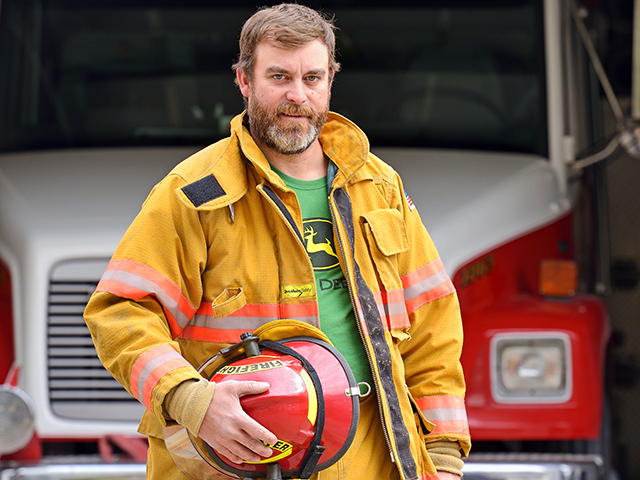Rural 911
Community - Rural 911
If you're in an accident in a rural area, pray someone like John Bentley takes the call. "I've grown up here. I know where it is," the Macedonia, Iowa, farmer says. A volunteer fireman for 22 of his 40 years, he not only knows where most of the residents of Macedonia live, all 245 of them, but he knows who works in which fields, saving precious minutes in an emergency.
Even though Bentley is technically a volunteer fireman, he will tell you he was drafted. His late father, Rod, had three farm fires in one year. The locals ribbed him, saying he had so many fires he needed to join the fire department. He didn't want to, so he sent his son John instead. And, John Bentley has no regrets, even though his plate is pretty full. He farms 2,600 acres, feeds around 850 head of cattle, not to mention being a single dad to Ethan, 12.
"It is a way to give back to the community," he says. He is one of 14 volunteers at the Macedonia Fire Department, which also has an ambulance with four active emergency medical technicians (EMTs). In all, they cover around 30 square miles and serve some 550 residents.
A LIFETIME OF SERVICE
Like Bentley, Eddie Tigue grew up in the area he serves, Dutton, Alabama. His father, Charles, was a charter member of the Dutton Fire Department and the Scottsboro-Jackson County Rescue Squad. Tigue, 62, joined as a junior volunteer when he was 15.
P[L1] D[0x0] M[300x250] OOP[F] ADUNIT[] T[]
"I washed trucks, coiled hoses and went to classes," he says. Tigue works full time for the municipal water system in Jackson County and runs a small cow/calf operation with his son, Alex. He still finds time to take every fire and rescue class that comes along. He's a certified fireman and instructor through the state fire college, and has had a rappelling class, a basic EMT class and a FEMA-sponsored wide-area search class. "Some people have hobbies like hunting, fishing or golf. This is my hobby," he says.
You'd think in these days of GPS and 9-1-1 addresses, emergency workers like Bentley and Tigue wouldn't have to rely on longtime ties to a community to know how to find a fire. But, you'd be wrong. Tigue says finding the emergency is a struggle every day on every call.
"I doubt 10% of the addresses are marked right," he says. "Unless it is somebody we know, we're slowing down and turning around trying to find them. Most everybody has a 9-1-1 address now, but they don't display them properly."
Tigue encourages everyone to mark their mailboxes so they can be seen at night and in the rain. Use 3-inch, high-reflective letters and numbers on a dark background. Peel back the shrub from your mailbox. Remember, emergency responders are running down the highway at 60 mph trying to reach you to help. Make sure they can see those numbers.
In Bentley's home county of Pottawattamie, Iowa, rescue squads have it a bit easier. Their rural areas are laid out in square 640-acre sections with roads running either east-west or north-south. The county provides signs to homeowners, and they're placed next to the road. Roads, even gravel roads, are marked. Numbered signs are in place at each field where there are grain bins. Knowing the name of crossroads near the incident helps, and Bentley says the lay of the land, with few trees, typically means they can see smoke a half-mile or more away.
He adds it's a good idea when possible to send someone to meet emergency responders at an easy-to-find spot. "If somebody is there with any other type of vehicle, it is very helpful if they can meet the fire trucks at the road and lead them to the fire."
DON'T COUNT ON GPS
Today, a lot of people think it's not important to mark their home addresses with GPS technology.
"If you put my address in, it takes you a mile down the road," says Tigue, noting that GPS can be off considerably. Ken Burns, agrees, saying it takes money to update guidance information, a resource many rural communities don't have. Burns is Emergency Management Agency head for Randolph County, Georgia, as well as fire chief. He recommends in addition to clearly marking your address on the mailbox and house, you consider signing up for a free home inspection where available.
"A lot of fire departments offer free home inspections," he says. "That gets them to your house and lets you meet them. It's also a good way to let them know if a disabled person lives at the address who might need extra help.
In many areas, he adds, signs with 9-1-1 numbers can be obtained from the county or the fire department for a small charge or, in some cases, for free.
Burns adds that hunt camps are good examples of remote locations where accidents happen and emergency responders can have a hard time finding them. Field roads going to hunt camps often don't have assigned 9-1-1 numbers, and many aren't marked. He urges hunters to tell the sheriff's office the location of their camp so responders have access to the data. To aid in rescues in these remote areas, Burns adds they outfitted a Polaris Ranger with a stretcher.
Even with high-tech aids and specially outfitted rescue equipment, Alabama's Tigue says the most important element is always going to be you. "People want to display their favorite football team or a cow or a tractor sign, but not their 9-1-1 address. Make sure it can be seen."
[PF_0421]
(c) Copyright 2021 DTN, LLC. All rights reserved.




